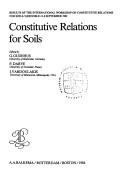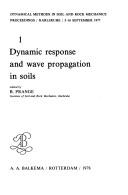| Listing 1 - 7 of 7 |
Sort by
|
Book
ISBN: 354036353X 9786613082787 3540363548 1283082780 Year: 2011 Publisher: Heidelberg [Germany] : Springer,
Abstract | Keywords | Export | Availability | Bookmark
 Loading...
Loading...Choose an application
- Reference Manager
- EndNote
- RefWorks (Direct export to RefWorks)
Soil is matter in its own right. Its nature can be captured by means of monotonous, cyclic and strange attractors. Thus material properties are defined by the asymptotic response of sand- and clay-like samples to imposed deformations and stresses. This serves to validate and calibrate elastoplastic and hypoplastic relations with comparative plots. Extensions capture thermal and seismic activations, limitations occur due to localizations and skeleton decay.Attractors in the large characterize boundary value problems from model tests via geotechnical operations up to tectonic evolutions. Validations of hypoplastic calculations are shown with many examples, possible further applications are indicated in detail. This approach is energetically justified and limited by critical points where the otherwise legitimate continuity gets lost by localization and decay. You will be fascinated by the fourth element although or just as it is so manifold.
Agriculture. --- Soil mechanics. --- Soil. --- Soil mechanics --- Civil & Environmental Engineering --- Mechanical Engineering --- Engineering & Applied Sciences --- Hydraulic Engineering --- Civil Engineering --- Soil engineering --- Soils --- Soils (Engineering) --- Mechanics --- Engineering. --- Geophysics. --- Geotechnical engineering. --- Amorphous substances. --- Complex fluids. --- Engineering geology. --- Engineering --- Foundations. --- Hydraulics. --- Geoengineering, Foundations, Hydraulics. --- Engineering, general. --- Geotechnical Engineering & Applied Earth Sciences. --- Geophysics/Geodesy. --- Soft and Granular Matter, Complex Fluids and Microfluidics. --- Geology. --- Geotechnical engineering --- Foundations --- Soil physics --- Hydraulic engineering. --- Physical geography. --- Geography --- Construction --- Industrial arts --- Technology --- Engineering, Hydraulic --- Fluid mechanics --- Hydraulics --- Shore protection --- Engineering—Geology. --- Complex liquids --- Fluids, Complex --- Amorphous substances --- Liquids --- Soft condensed matter --- Geological physics --- Terrestrial physics --- Earth sciences --- Physics --- Engineering, Geotechnical --- Geotechnics --- Geotechnology --- Engineering geology --- Flow of water --- Water --- Hydraulic engineering --- Jets --- Architecture --- Building --- Structural engineering --- Underground construction --- Caissons --- Earthwork --- Masonry --- Soil consolidation --- Walls --- Civil engineering --- Geology, Economic --- Flow --- Distribution --- Details --- Geology
Digital
ISBN: 9783540363545 Year: 2011 Publisher: Berlin, Heidelberg Springer Berlin Heidelberg
Abstract | Keywords | Export | Availability | Bookmark
 Loading...
Loading...Choose an application
- Reference Manager
- EndNote
- RefWorks (Direct export to RefWorks)
Fluid mechanics --- Matter physics --- Chemistry of complexes --- Geophysics --- Meteorology. Climatology --- Hydraulic energy --- Mining industry --- Engineering sciences. Technology --- Structural parts and elements of building --- Physical geography --- opwarming (milieu) --- funderingen --- duurzame energie --- complexen (chemie) --- mijnbouw --- materialen (technologie) --- ingenieurswetenschappen --- fysische geografie --- geofysica --- hydraulica --- klimaatverandering --- vloeistoffen
Book
Year: 1977 Publisher: London : John Wiley,
Abstract | Keywords | Export | Availability | Bookmark
 Loading...
Loading...Choose an application
- Reference Manager
- EndNote
- RefWorks (Direct export to RefWorks)
Soil mechanics. --- Rock mechanics. --- Finite element method.
Book
ISBN: 9061910250 Year: 1978 Publisher: Rotterdam : A.A. Balkema,
Abstract | Keywords | Export | Availability | Bookmark
 Loading...
Loading...Choose an application
- Reference Manager
- EndNote
- RefWorks (Direct export to RefWorks)
Rock mechanics. --- Soil mechanics. --- GEOLOGIE DE L'INGENIEUR --- PROPRIETES MECANIQUES ROCHES --- ROCHES MEUBLES --- GEOTECHNIQUE --- DONNEES EXPERIMENTALES
Book
ISBN: 9783540363545 Year: 2011 Publisher: Berlin, Heidelberg Springer Berlin Heidelberg
Abstract | Keywords | Export | Availability | Bookmark
 Loading...
Loading...Choose an application
- Reference Manager
- EndNote
- RefWorks (Direct export to RefWorks)
Soil is matter in its own right. Its nature can be captured by means of monotonous, cyclic and strange attractors. Thus material properties are defined by the asymptotic response of sand- and clay-like samples to imposed deformations and stresses. This serves to validate and calibrate elastoplastic and hypoplastic relations with comparative plots. Extensions capture thermal and seismic activations, limitations occur due to localizations and skeleton decay.Attractors in the large characterize boundary value problems from model tests via geotechnical operations up to tectonic evolutions. Validations of hypoplastic calculations are shown with many examples, possible further applications are indicated in detail. This approach is energetically justified and limited by critical points where the otherwise legitimate continuity gets lost by localization and decay. You will be fascinated by the fourth element although or just as it is so manifold.
Fluid mechanics --- Matter physics --- Chemistry of complexes --- Geophysics --- Meteorology. Climatology --- Hydraulic energy --- Mining industry --- Engineering sciences. Technology --- Structural parts and elements of building --- Physical geography --- opwarming (milieu) --- funderingen --- duurzame energie --- complexen (chemie) --- mijnbouw --- materialen (technologie) --- ingenieurswetenschappen --- fysische geografie --- geofysica --- hydraulica --- klimaatverandering --- vloeistoffen

ISBN: 906191549X Year: 1984 Publisher: Rotterdam : A. A. Balkema,
Abstract | Keywords | Export | Availability | Bookmark
 Loading...
Loading...Choose an application
- Reference Manager
- EndNote
- RefWorks (Direct export to RefWorks)
Soil mechanics --- Soils --- Congresses. --- Testing --- Soil mechanics. --- Testing.

ISBN: 9061910234 9789061910237 9061910242 9061910250 9061910269 Year: 1978 Publisher: Rotterdam : A. A. Balkema,
Abstract | Keywords | Export | Availability | Bookmark
 Loading...
Loading...Choose an application
- Reference Manager
- EndNote
- RefWorks (Direct export to RefWorks)
Rock mechanics --- Rocks --- Soil mechanics --- Soils --- Congresses. --- Testing --- Rock mechanics. --- Soil mechanics. --- Geophysics. --- Plastics. --- Soils. --- Roches, Mécanique des. --- Mécanique des sols. --- Géophysique. --- Matières plastiques --- Sols.
| Listing 1 - 7 of 7 |
Sort by
|

 Search
Search Feedback
Feedback About UniCat
About UniCat  Help
Help News
News